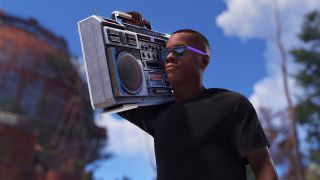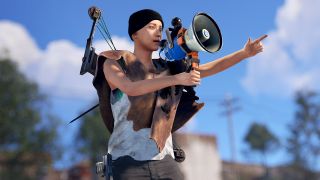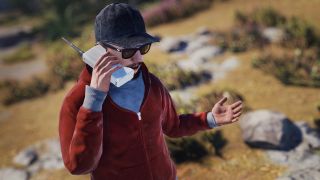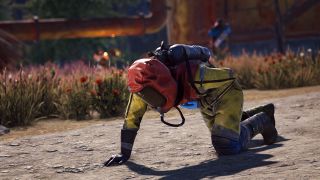Rust DLC gets loud with boom boxes, megaphones, and a disco
Plus mobile phones and voicemail, so people can yell at you even when you're offline.

Rust's July update has arrived, and it's bringing the noise. New DLC for Facepunch Studio's popular multiplayer survival game is a loud one, featuring audio cassettes you can use to make recordings, boom boxes for playing cassettes or streaming internet radio, and megaphones and microphones that amplify and modify your voice.
There's also a chunky '80s-style mobile phone included, which will allow you to access Rust's telephone system on the go. There's even voicemail, so people can leave you messages when you're offline or occupied. I'm sure all the messages will be nice ones.
Plus, there are disco props like a glittering disco ball and laser lights, and three new dance emotes to go along with them. The Voice Props DLC will run you $12.99 on Steam (though there's currently a 10% discount). Here's everything it comes with:

- Cassettes and Recordings: Cassettes can store snippets of audio and can be used in a variety of ways.
- Boom Boxes: If you want to play your audio on something with a bit more oomph you can use a Boom Box. Coming in both static and deployed versions, you can use a Boom Box to play both recorded audio on Cassettes and stream internet radio. Deployed Boom Boxes can also be connected to other audio entities via the Audio Out IO port.
- Megaphone and Microphone Stand: You can project your voice to friends and foes with the Megaphone and Microphone Stand. The Megaphone is a held entity that you can use while out and about. The Microphone Stand is a deployable version of the Megaphone that requires power. It has two different voice modes to modify your voice (squeaky and deep) and has an Audio Out IO port like the Boom Box to connect to other props in the DLC pack.
- Disco Props: Give your base some late night disco vibes! Use the Disco Floor, Laser Light, Connected Speaker and Sound Light to set up a dancefloor that will make your neighbours jealous. All of these props have an Audio In IO port so you can connect them to an audio source (like a Boom Box or Microphone Stand) to make them react to any playing audio. The Connected Speaker will rebroadcast any audio from an audio source that it’s connected to, so you can play music throughout your entire base or hook them up to a Microphone Stand to make a base wide PA system.
- New Dances: A dancefloor is pointless without dancing, so this DLC pack includes three new dance gestures. Unlike the existing gestures these dances will loop endlessly and you won’t be able to move while dancing. To cancel a dance you can just press a move input, jump, crouch or hit LMB.
- Mobile Phone: Take calls on the go - and stylishly - with the latest in telecommunications technology on the island: the Mobile Phone! Giving you access to the telephone system from anywhere on the island. You can open the dialler with LMB and still move around while chatting.

If you're not the DLC-buying sort, there are still some additions to Rust in the July update you don't need to pay for. DLSS has been added, which will (hopefully) boost performance without loss of image quality if you're running an RTX Nvidia card. DLSS can "improve upon Rust’s previous anti-aliasing options, with reduced temporal anti-aliasing, superior detail in the distance, and improved anti-aliasing on the game’s massive amount of foliage," according to Nvidia.
There's also been an update to the wounding system, where players will actually be able to crawl around instead of just lying there helpless and incapacitated. Crawling players will even be able to open doors as they scrabble around for a safe place to heal, or maybe crawl to the nearest megaphone and yell for help. Crawling doesn't always happen when wounded, though—if you take too much fall damage (like, say, from jumping out of a helicopter) you'll still go into the original incapacitated state.
For a full view of the July update, head over to Rust's official blog.






If you're not the DLC-buying sort, there are still some additions to Rust in the July update you don't need to pay for. DLSS has been added, which will (hopefully) boost performance without loss of image quality if you're running an RTX Nvidia card. DLSS can "improve upon Rust’s previous anti-aliasing options, with reduced temporal anti-aliasing, superior detail in the distance, and improved anti-aliasing on the game’s massive amount of foliage," according to Nvidia.
The biggest gaming news, reviews and hardware deals
Keep up to date with the most important stories and the best deals, as picked by the PC Gamer team.

There's also been an update to the wounding system, where players will actually be able to crawl around instead of just lying there helpless and incapacitated. Crawling players will even be able to open doors as they scrabble around for a safe place to heal, or maybe crawl to the nearest megaphone and yell for help. Crawling doesn't always happen when wounded, though—if you take too much fall damage (like, say, from jumping out of a helicopter) you'll still go into the original incapacitated state.
For a full view of the July update, head over to Rust's official blog.

Chris started playing PC games in the 1980s, started writing about them in the early 2000s, and (finally) started getting paid to write about them in the late 2000s. Following a few years as a regular freelancer, PC Gamer hired him in 2014, probably so he'd stop emailing them asking for more work. Chris has a love-hate relationship with survival games and an unhealthy fascination with the inner lives of NPCs. He's also a fan of offbeat simulation games, mods, and ignoring storylines in RPGs so he can make up his own.
Most Popular






